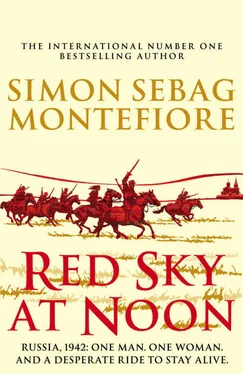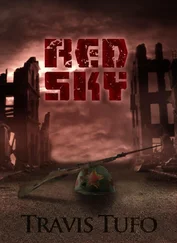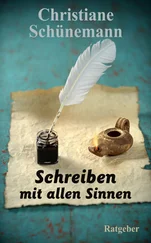There’s singing from the millhouse where the rest of the squadron are swimming in the stream, stark naked. Benya looks at their tanned faces and necks with a ‘V’ down their chests; their bodies are as white as snow. He throws off his clothes, so hot suddenly that the cold seems to scald him.
Wearing damp clothes that dry fast, Benya lies on a mattress in the shade of a house behind a wattle fence. The house smells of kvass and sausage. There’s the pungent fug of closely packed, sweaty bodies, which he recognizes as one of the pervasive smells of war and prison. A peasant woman in an embroidered hat and skirts sits and stares at him. She gives Benya a glass of milk but she has a sly look. It’s hospitality – or a dagger in the back. Ruined people are cruel people.
Exhausted, Benya fights to stay awake. He hasn’t slept for twenty-four hours or more, but he is still scudding from the revelation of his newly discovered other self. His sword arm aches and burns: he can hardly lift it; his thighs are agony, and he can barely walk. Yet he is alive. More than alive. He is transfigured. Through the blade he felt the softness of his fellow humans. He has killed several men, men whose eyes he looked into, not Germans but Italians, his favourite nation on earth. He thought he was killing German Nazis. Instead they were the people of Michelangelo, Raffaello and Tiziano and, as if to make the point, someone has found an Italian gramophone. The aria of Rigoletto soars into the still afternoon air. He falls asleep, dreaming…
The music stops abruptly, and Benya sits up. It’s as if he has awoken in another dimension. The atmosphere is quite different, a swerve of mood, a darkening under the blinding sun. Perhaps it was something to do with the drink? Or just the flesh-eating instinct of born killers who have no other way of expressing themselves, or of feeling free and alive? He goes outside and sees those cutthroats he knows so well, Smiley, and Cut and Run, staggering into cottages.
The goose is ready. It’s been cooked so long the flesh melts on his tongue. Plates of eggs and pork and kasha and the meat of a dead camel are put before him. For dessert: cherries and peaches. This is a rich, black-earthed land, and Benya eats like an animal, even the chewy camel meat, virtually licking the plate clean. He hasn’t enjoyed such plenty since before his arrest, and the men trough almost silently, quaffing wine and cha-cha , getting sunburnt and soused, like lords of creation. Afterwards, Benya checks on Silver Socks, who is lying down outside in the shade, her legs folded under her. She is not feverish, she’s eaten, and her neck looks clean.
When Benya went to sleep, there had been laughter and splashing and flirting, a sense of triumph, a glaze of evervescence. They had pulled it off. They had broken the enemy, taken this village. Haven’t they earned their redemption? But now the milk is soured, the sun is so hot that Benya feels its pulse throbbing, and there’s shouting behind the stables. In the yard of the priest’s house, the Political Officer, Ganakovich, is interrogating a collaborator, a Kalmyk scout with wild sweat-pleated hair and grey German britches. The traitor is tied to a chair, bleeding from the eyes, and there are teeth scattered around like jewels. There’s a fat Italian there too, just a boy, sitting against a wicker fence, watching as if this has nothing to do with him.
When he sees Benya, he asks in Italian: ‘When will we go home? Will we ever eat spaghetti and wine again?’
‘ Si, si, ragazzo, presto! ’ Benya knows some Italian and he understands and is suddenly overcome with the urge to weep, to hug the boy.
Ganakovich is nervous. He looks around and sees Zhurko in the doorway. ‘Where’s the support? Where’s the artillery?’ he blurts out. ‘Where’s Melishko?’
‘They should be on their way,’ Zhurko opines. ‘But I’ll take a look,’ and he heads towards the stables.
‘What about Mogilchuk? We need the Special Unit here, don’t we?’ No one answers this and no one but Ganakovich misses those hyenas. Then he shouts at the scout, ‘Where are the rest of you traitors? Where’s Mandryka and his auxiliary police?’ He is waving his pistol around in a way that proves he has never seen battle. Ganakovich, Benya knows, is a blowhard in the Russian tradition: a tyrant to those below, a slave to his masters.
Garanzha approaches softly and then suddenly his steps are as light as a ballerina’s and the spasm of violence so quick Benya doesn’t see it; and the scout starts to talk. With his round, leathery face and almond-shaped eyes, he’s a descendant of Genghis Khan perhaps and they’re still Buddhists… the Kalmyk scout is a tough customer, but he has betrayed Russia, and knows there will be no quarter given.
‘Mandryka’s Hiwis?’ he asks. Benya doesn’t know what he’s talking about but he does know that ‘Hiwi’ is short for Hilfswilliger , ‘willing to help’, the name for all Russian traitors, such as the Schuma auxiliary police, who have thrown in their lot with the Germans. ‘Yes, they’re at that village, Shepilovka.’
‘Where’s that?’ Even Ganakovich has no idea where they are.
‘Ten miles west from here.’ The scout speaks in a toothless monotone, no effort necessary now, death imminent, in an accent that mixes Russia with the Mongol East.
‘Where are German forces massed?’ Ganakovich asks.
‘All around you. See the dust rising.’
Ganakovich peers around and sure enough, in the distance, clouds of dust roll forward like a giant wave.
‘The offensive is about to start again soon. You got lucky, Cossacks,’ the scout says.
‘Lucky? What do you mean?’
‘You’re Shtrafniki, aren’t you?’ replies the scout. ‘There’s no backup coming behind you. The Italian Colonel Malamore was here with the traitor Mandryka and some Germans. Just a few hours ago. They know you’re here… But as for you – you’re on your own.’
Ganakovich is stunned. Unsure what to do, he tells Spider to send the prisoners back to headquarters, and reels out on to the street.
Garanzha has an ominous ticking stillness about him. ‘What are you looking at?’ he asks.
‘What are you going to do?’ says Benya.
Spider looks right at Benya and, surprisingly in that sharkish face, he has the milkiest goo-goo eyes that could loll a baby to sleep – even as he draws his dagger.
‘Garanzha’s got his butcher’s grin! Like it’s a holiday and he’s about to slaughter a sheep.’ It’s Prishchepa, cheerful as a chaffinch. ‘Put it away, brother,’ he says.
Garanzha sheathes the dagger, and the Kalmyk nods gratefully but without much conviction.
‘What’s going on?’ asks Prishchepa. ‘The girls in this village are beauties. Mine’s called Aksinya, fresh as a punnet of strawberries…’ He beams carelessly at the prisoners and the Shtrafniki – as if both are equally his pals. ‘Must go. Aksinya’s waiting,’ and as he leaves, it happens so fast: Garanzha is giving his goo-goo eyes to Benya, never even looking at the scout, as his steps go all quick and balletic and somehow, in that instant, the blade has done its work. The scout twitches slightly as if falling asleep, and the blood pumps out in fast and then shorter and shorter spouts.
‘Ahh! Mama!’ It is the Italian boy, staring at the dead scout. Something clicks as he realizes that gentle routines of the Venetian slums, licking gelato in the campo with his mama, coffee with his papa at his usual table, catching the vaporetto to his grandmother’s, all the things he knew and took for granted that he would see again, are gone.
‘ Ciao, ragazzo , where are you from?’ Benya distracts him in Italian.
Читать дальше












